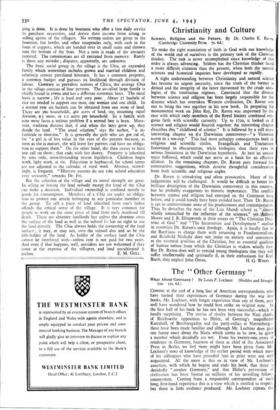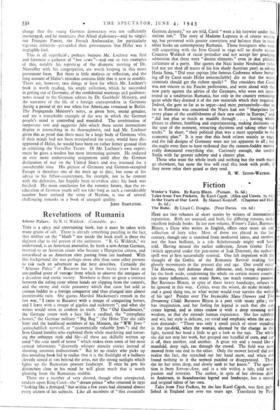The " Other Germany "
COMING at the end of a long line of Amerimn correspondents who have turned their experiences of Germany during the war into books, Mr. Lochner, with longer experience than any of them, may well have wondered how he could best strike an original note. In the first half of his book he has not been very successful—which is hardly surprising. The stories of rivalry between the Nazi chiefs, of Reichswehr opposition to Hitler, of Goering's magnificent Karinhall, of Berchtesgaden and the party-rallies at Nuremberg— these have been made familiar and although Mr. Lochner does give one funny story about the Nazis which seems to be.new, he gives a number which decidedly are not. From his twenty-one,.years of residence in -Germany, fourteen of them as chief of the Associated Press in Berlin, we feel snore might have been given from Mr. Lochner's store of knowledge of the earlier period with which most of his colleagues who have preceded him in print were not well acquainted. All the more is this so in view of Mr. Lochner's assertion, with which he begins and ends his book, that there is decidedly " another Germany," and that Hitler's perversion of civilisation has been foisted on millions of his unwilling fellow- countrymen. Coming from a responsible correspondent of such long, first-hand experience this is a view which is entitled to respect, but there is little evidence produced. Mr. Lochner repeats the
charge that the young German democracy was not sufficiently encouraged, and he maintains that Allied diplomacy—and he singles out Francois Ponces, the French Ambassador, for particularly vigorous criticism—persuaded their governments that Hitler was a negligible fool.
This is all superficial ; perhaps because Mr. Lochner was first and foremost a gatherer of " hot news "—and one or two examples of this, notably his reporti gig of the dramatic meeting of Dr. Niemiffier with his congregation, are worth keeping in this more permanent form. But there is little analysis or reflection, and the long account of Hitler's mistakes contains little that is new or notable. There are, however, two things at least for which Mr. Lochner's book is worth reading, his ample collection, which he succeeded in getting out of Germany, of the confidential warnings and guidance- notes issued to the German editors by Dr. Goebbels' Ministry, and the narrative of the life of a foreign correspondent in Germany during a period of the war when few Americans remained in Berlin. The Propaganda Ministry's notes, as given here, sound genuine, and are a remarkable example of the way in which the German people's mind is controlled and moulded. The combination of suppressio veri and suggestio falsi which these secret instructions display is astonishing in its thoroughness, and had Mr. Lochner given this as proof that there must be a large body of Germans who, if their minds had not been manipulated for years, would have dis- approved of Hitler, he would have been on rather firmer ground than in criticising the Versailles Treaty. Of Mr. Lochner's own experi- ences he gives a modest but most interesting account. He endured an ever more embarrassing assignment until after the German declaration of war on the United States and was interned for a considerable time. His picture of Germany and German-occupied Europe is therefore one of the most up to dm.; but some of his advice to his fellow-countrymen, for example, not to be content with the defensive, has happily been overtaken since his book was finished. His main conclusion for the remoter future, that the re- education of German youth will not take long as such a considerable number have resisted the virus of Nazism, is one of several challenging remarks in a book of unequal quality.
JOHN STAPLETON.



























 Previous page
Previous page